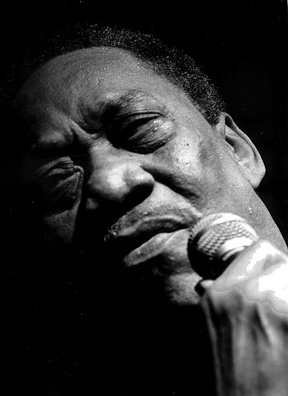
The heroes of '60s and '70s soul are everywhere—oldies radio, bar jukeboxes, late-night talk shows, TV commercials. Dead or alive, few of the biggest names in the music are more than a few minutes away from being heard in the world. Even Etta James, who rarely crossed over to the pop charts in her youthful heyday, is a latter-day heroine to listeners of more than one generation.
But what of Bobby "Blue" Bland? Sometimes called "the Sinatra of the blues," the Tennessee native is creeping past the age of 75 on his tour bus, hitting a string of favorite haunts—a mainstay of black banquet halls, blues festivals, and supper clubs like Jazz Alley, to which he returns this week. Despite 24 Top 10 R&B singles (and nearly 40 more overall chart entries), an audience that turns out faithfully to bask in his vocal and personal warmth, and a string of latter-day album successes on the Southern-soul label Malaco, a sense of hidden treasure still clings to Bland. (Word of mouth does its part; a friend who first accompanied me to a Jazz Alley set a few years ago made reservations to bring her own party to three nights of this week's stint.)
On any given night, he might be winning over a new fan (after an opening slot for Van Morrison in the U.K., a blissful notice in Mojo implied that the reviewer had never heard him before.) Hip-hop listeners probably now know his voice-print better than the oldies-radio crowd; Jay-Z's "Heart of the City (Ain't No Love)" sampled Bland's 1974 smooth-soul jam of similar title.
The tuxedos of old are gone, as are (in the wake of heart surgery a few years ago) the cigars his valet used to light onstage, replaced by expensive gym wear and a glass of water. His trademark squawl has long since given way to a rough snort that cultists regard with affection. But the heart of his sound remains: a creaminess that, within less than a second, can give way to a wig-raising holler. Bland may be the finest singer of his generation still living—and you can include Tony Bennett in there, if you like.
Bobby "Blue" Bland could both comfort and chill, perhaps most effectively on those celebrated opening lines from the 1960 single "Lead Me On." By that year, the already veteran performer was truly finding his style, shifting from the Texas-roadhouse raving of "Farther Up the Road" to a more flexible delivery that allowed for both purring and yelping. In the case of "Lead Me On," his quietude sounded confessional a decade before the word was applied to a generation of white singer-songwriters.
Two Steps From the Blues, his first LP, still sums up the different points of Bland's appeal. Shattering when charting both the highs ("I've Been Wrong So Long") and lows ("I've Just Got to Forget You") of love, proffering the Zen-blues poetry of "I Pity the Fool" ("Look at the people/I know you're wondering what they're doing/They're just standing there/Watching you make a fool of me") or a near-wordless yowl on the out- chorus of "Little Boy Blue," Two Steps is as essential to its genre as Kind of Blue and Nevermind are to theirs.
But it hardly ends there. Bland is almost always worth hearing, whether on 1966's bitter "Poverty," 1985 misery-loves-company anthem "Members Only," or 1998's cover of ZZ Top's "Tush"— the latter repaying a tip of the hat or two from the Gibbons crew over the years. Both respected by those in the know and invisible to the rest, Bland is one great—"living legend," if you must—who at once gets his due and deserves much more. He plays with the lines of genre while defining a segment of blues music that's often overlooked in the rush to anoint one more guitar hero. Bland, in fact, has a fine player in his own small combo. He's smart enough to stay out of the boss' way, knowing that a voice like this is hard to find in any generation.

Nenhum comentário:
Postar um comentário